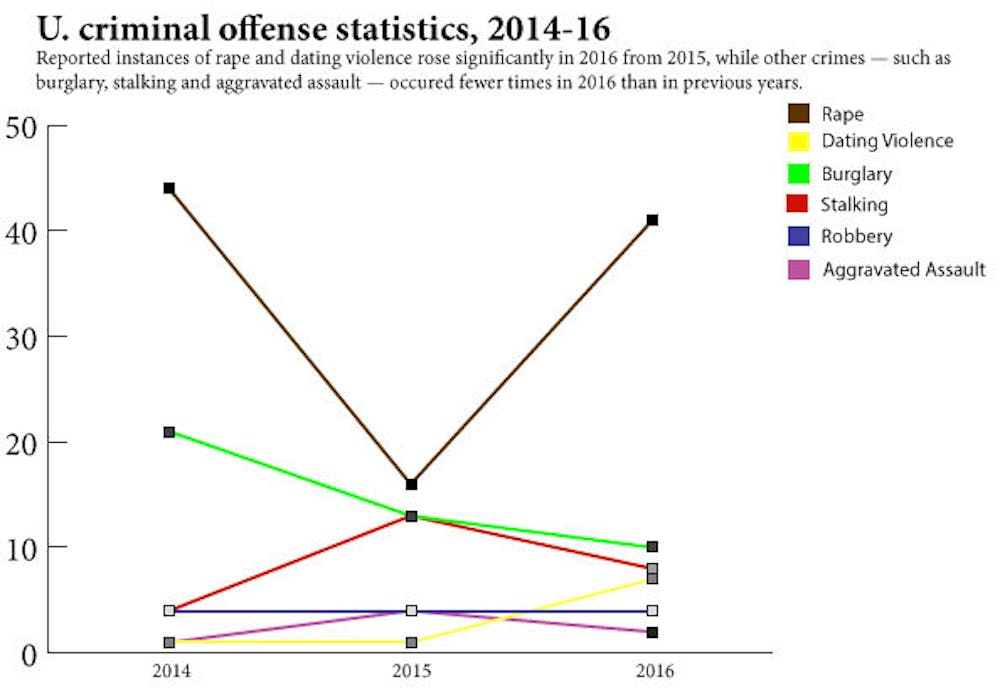The Department of Public Safety released its Annual Security Report, which documents crime trends on campus for 2016, in a community-wide email Sept. 29. This year’s report reported higher numbers of rape, dating violence and hate crimes, while burglary has continued to decrease.
According to the security report, there were higher reports of dating violence and rapes in 2016 compared to 2015.
Title IX Program Officer Rene Davis said higher reported incidences of dating violence and stalking may indicate that students have a broader understanding of sexual violence and are thus able to identify when it happens. External factors like last year’s presidential election could also influence reporting rates for sexual violence.
“For some individuals, it might have a closeting effect where they might say, ‘You know what, if this could happen at this level, (then for) my small story, no one’s going to take it seriously,’” Davis said. She added that conversely, the election may also encourage people to want “to shine a light on this.”
DPS also responded to more hate crimes last year. In 2015, there were three hate crimes reported under the Clery Act, the law that requires universities to compile an annual crime report. Last year, there were nine.
The Clery Act defines a hate crime as any crime where “the victim was intentionally selected because of the perpetrator’s actual or perceived bias regarding: race, religion, gender identity, ethnicity, national origin and/or disability.”
“We did have a substantial amount of bias markings and writings on campus buildings and whiteboards on campus, so that (increase) would be the result of that,” Porter said.
Changes in the reported numbers of some crimes might not necessarily reflect an increase in the actual number of incidents, said Chief of Police Mark Porter. Under the Clery Act, only incidents that occur in certain geographical zones are reported, so this fluctuation could demonstrate an increase in number of reported incidents within specific geographical zones rather than the overall area.
Clery reporting environments include any properties owned or controlled by the University, public properties nearby and off-campus sites affiliated with the University, according to the Higher Education Compliance Alliance’s website. Though DPS may be receiving the same amount of reports, several reports may not have been counted for the report because they did not occur in the areas specified by the Clery Act.
One of the primary functions of the security report is to encourage reporting for typically underreported crimes and then address the issues that the data reflect, Porter said.
Nationally, 80 percent of sexual assaults are unreported, according to the National Research Council.
To make the report as comprehensive as possible, DPS gathers statistics about crimes like rape, dating violence and stalking not only from designated “Campus Security Authorities” — people who are federally mandated under the Clery Act to report to DPS — but also from confidential resources like Counseling and Psychological Services and Sexual Harassment and Assault Resources and Education.
“We encourage more reporting even though they’re not mandated, because we think it gives us a much more comprehensive number. … It also allows for and encourages a climate of reporting instead of not reporting,” Porter said. “We’ve always thought that when our numbers are low that they were also … underreported,” Porter said.
All information provided to DPS by CAPS and SHARE remains anonymous, said Assistant Director of CAPS Laura Sobik and SHARE advocate Alana Sacks.
“We participate by completing a form that identifies the type of violence without including any names or specific locations to not conflict with patient confidentiality,” Sacks wrote in an email to The Herald.
Campus Security Authorities and confidential resources fill out the same incident report form to provide information to DPS. Portions of the form that ask for the victim’s name and phone number may be left blank, Davis said.
Communication between DPS and staff who serve Campus Security Authorities within the athletics department is strong, according to Deputy Director of Athletics Colin Sullivan. Athletics contains a number of employees who act as Campus Security Authorities.
“I think there’s a good process, and it’s just about creating a safe and comfortable environment,” Sullivan said.
The Title IX Office also has a strong partnership with DPS, Davis said.
“I think when individuals go directly to (DPS), they make sure that they loop me in so that the student is receiving all sorts of care,” Davis said. “When I have individuals come forward to me, but they’re not ready to report, I see (DPS) as a partner that I would try to get a student to connect to them to talk about safety planning,” she added.
As DPS monitors the trends in the security report, Porter said he remains confident in DPS’s ability to keep the community safe.
Any reduction in crime “is a tribute to the amount of uniformed officers out on patrol,” Porter said. “Overall, Brown continues to be a very safe campus.”





